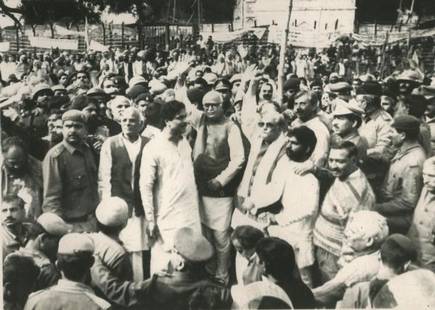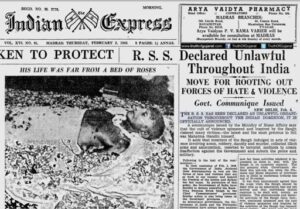Harsh Mander
A hundred years have passed since a battle was launched for the soul of this ancient land. At stake was the country we would together build after the British left our shores.
This was the time when Mahatma Gandhi returned from South Africa to join India’s freedom struggle. In his leadership of three decades, a majority of Indians—Hindu, Muslim and of other faiths—shared his vision of a country resolutely inclusive and humane, which would welcome people of every belief and ethnicity to be equal citizens with equal rights. This ideal lay at the foundations of the constitution of the new republic, crafted in the care of Babasaheb Ambedkar.
This goal was bitterly contested all these hundred years by the Hindu Mahasabha, founded around 1915, and by the RSS in 1925. Their vision for India was of a nation exclusively for India’s Hindu majority, in which Muslims and Christians would be ‘allowed’ inclusion only as second-class citizens. Though less explicitly enunciated, people of disadvantaged castes and tribal ethnicities would also be lesser citizens.
The turbulent combat eventually took a toll of over a million lives, including that of Gandhiji, and caused the largest cataclysmic displacement of human populations in history.
Today, we find ourselves at a decisive phase of this same battle. We are led today by men who have spent all their adult lives as staunch members of the RSS. They believe their time has come, to remould India into the muscular and resentful nation of their imagination.
Ideals of the past
I was born eight years after India won her freedom. I recall a childhood in which the idealism of the freedom struggle, although rapidly unravelling, still endured. We were raised without bigotry, taught to be thrifty and kind. Friendships across religion were common (though much less, I realise now, across caste). Our cinema, our poetry, music and theatre, celebrated our plural identities. It was an unequal India, but comfortable in its diversity, stirred with the hope of building a better future for all our people.
Today, my grandson is being raised in a worryingly altered India. From the time he will make sense of his world, he will routinely hear conversations of bigotry and exclusion, in living rooms, in classrooms, on his phone and laptop, on his television screen. He will join a section of the world that is complacent in its comfort and vulgar overconsumption, indifferent to the stark penury and want outside its doors.
India did not suddenly change in recent years. The slide started much earlier. In college, idealistic students of earlier batches had disappeared into the countryside to fight rural oppression. We fought against the corruption and authoritarianism of the Congress government and against the Emergency. The 1980s saw vast fractures crack India’s plurality: calamitous communal massacres, regressive mobilisation against the rights of Muslim women, a violent campaign to destroy a mosque in Ayodhya, to demonise the Muslim, and to construct a sense of permanent grievance in the Hindu people.
Since 2014, however, India has hurtled far more rapidly downwards to become a country increasingly dangerous and unwelcoming to minorities, especially its vast Muslim populace. Fear and hate have become inseparable from public life, for both minorities and for those who stand with them. Elected leaders flaunt hate speech, legitimising and valorising bigotry and hatred, which have become the dominant markers of social life. Crowds gather to lynch Muslims and Dalits in the name of protecting the cow, and proudly post videos of the lynching on social media. Relationships between Muslim men and Hindu women are stigmatised as love jihad. Christian priests, nuns and shrines are attacked. Dissenters are pilloried as anti-national. A new slur bandied by even the Prime Minister is something called ‘Urban Naxal’.
Vortex of fear
In the midsummer 2019 elections, the BJP government won an expanded mandate, despite economic collapse, mounting farm distress and unemployment peaking to a 45-year high. This has been interpreted by the leadership as a mandate to implement their alternate vision for India as a land only for Hindus. They have moved with resolve and swiftness, hubris and recklessness. Diminishing Kashmir to a Union Territory, the law criminalising triple talaq and the judicial ruling for a Ram temple at the site of the demolished mosque, all fulfil the long-prized agenda of the RSS.
The next pivotal step for this raging juggernaut is to create by law, for the first time, a hierarchy of citizenship rights based only on religion, which bars only India’s Muslims. This, if followed by the National Register of Citizens that has been pledged repeatedly by Home Minister Amit Shah, will thrust India’s Muslims into the same vortex of permanent fear and desperate insecurity that has been the fate of Bengali-origin people of Assam.
Then, like a sudden flash of brilliant light in a stormy night, the revolt led by students across the country has broken through the darkness. By refusing to allow their nation to be divided by hate, young people are challenging the government’s hubris. The movement might or might not sustain. But the fact that it has happened reassures us that our young have the moral fibre to seize the mantle. They will fight for the kind and equal country that Gandhi fought for a hundred years earlier.
(The writer is a human rights worker, author and teacher.)




